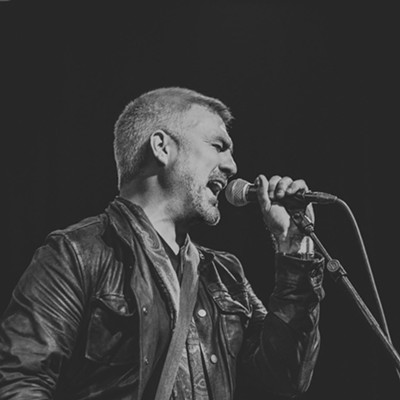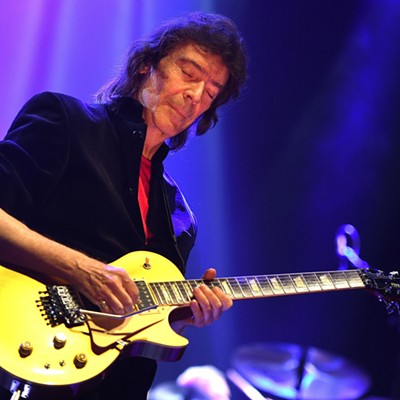Wondering why the Los Angeles-based hip-hop artist Pigeon John has such a nonthreatening, anti-hard-core rap handle?
Let him tell it:
"That comes from back when I was teenager," he says via cell phone from Iowa and on a concert tour that brings him this Saturday, Oct. 7, to Solar Culture Gallery.
"I wanted a real fresh rap name, but my friend was teasing me and said I should call myself Chicken John, like the Chicken George character from Roots. We laughed about that for a while, and then his mom stuck her head out from around the corner and said, 'You don't look like a chicken; you look more like a pigeon.' And the name stuck."
Truth be told, Pigeon John is hardly what you'd call a stereotypical rapper. For one thing, he doesn't boast of his sexual prowess or rap skills--his persona in songs is the antithesis of an O.G., a sensitive (well, sometimes wimpy) geek who is far from a chick magnet.
"Definitely, I like to think that I am not totally fitting in the genre," he says. "Making fun of myself kind helps me out in painting a picture of a person that is maybe more like the listeners than a typical rapper."
Born John Dust 33 years ago in Omaha, Neb., he moved with his family to Inglewood, a suburb of Los Angeles, when he was a child.
He began slinging rhymes as a young teen, and by the time he left high school in the early 1990s, he was rapping on stage during open-mic nights at the Good Life Café, which also became the proving grounds for other L.A.-based hip-hop artists such as the Freestyle Fellowship, Kurupt, the Pharcyde and Jurassic 5. He's also done time in the hip-hop collectives Brainwash Projects and L.A. Symphony.
But what sets Pigeon John apart from other rappers is his sweet-tempered, gentle delivery of songs that are witty, abstract, self-deprecating, supremely groove-adelic or subtly poignant, often all at the same time.
This is demonstrated on his recent third CD, Pigeon John ... and the Summertime Pool Party, on which the dapper, diminutive rapper (and talented singer) comes off like a funky aughts version of Kid Creole fronting Digital Underground.
Pigeon John says he became infatuated in the 1980s with the nonconformist hip-hop artists loosely united together under the umbrella Native Tongues, including the Jungle Brothers, A Tribe Called Quest and De La Soul.
"I guess I first heard the Jungle Brothers in 1987. My friend told me to get it--he worked at this music store--but it was not at all what I expected. At first, I was literally angry: 'Dude, this isn't even rap!' They were singing; they were doing house music. I thought I got gypped. Then I realized, these fools just don't care, and that pretty much sold me on the concept of doing what's in your heart.
"Then De La Soul exploded, and that was it, man. Their whole persona and style and attitude--that whole individualistic 'Me, Myself and I' thing--it was terribly influential on me."
You can hear Pigeon John express his unique voice in the playful, clever and musical songs on Summertime Pool Party--"Do the Pigeon," "Freaks! Freaks!," "As We Know It," "Brand New Day" and the nostalgic "Growin' Old," an extended shout-out to his hip-hop predecessors.
Pigeon John knows hip-hop music has come a long way in its 30 years, but he can't help but notice the less progressive roles played by larger mainstream acts.
"The stereotypes that are mostly being played are those that celebrate black men who used to sell drugs and used to pimp, who used to do this thing to girls, or are still doing this thing to them.
"I mean, look at the biggest rap icons of our generation: Biggie Smalls, ex-drug dealer; Jay Z, ex-drug dealer; Nas, ex-drug dealer. That's what the world sees rap as, by and large, and for me, that's a little one-sided."
Even so, he constantly finds himself pleased by the evolving nature of hip-hop, which in many ways mirrors the series of stylistic innovations that overtook jazz in the 1940s, '50s and '60s.
"I love when new styles of hip-hop come down, and everyone gets into it, young and old, whether it's from the Bay Area or Southern hip-hop or the East Coast stuff. Even if I'm not an immediate fan of a certain style, it all makes me believe it's still growing."







